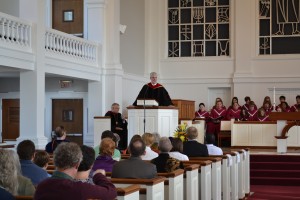
Reverand Doctor John Colatch spoke in Rooke chapel during his inaugural ceremony this past Sunday.
Will Fierman
Contributing Writer
At a ceremony in Rooke Chapel on Sunday, Nov. 11, the Reverend Doctor John Colatch was officially installed. His installation had been delayed to accommodate a particularly hectic fall term and the University’s fundraising campaign. Dean of Students Susan Lantz, Provost Mick Smyer, President John Bravman, and the University’s religious advisers, including Rabbi Serena Fujita and Father Fred Wangwe, all participated in the ceremony.
Having begun his tenure at the University a short four months ago, Colatch already works diligently to keep his finger on the pulse of the community he now serves, and can often be seen eating at the Bison or at the Seventh Street Cafe. As the active pastor of the Rooke Chapel Congregation, he officiates services in the Methodist tradition every Sunday. Services, he happily mentions, that are growing in attendance. This is perhaps in part due to his personal style of leadership; he prefers to abandon the pulpit to preach among the people in the aisle.
“I am part of the larger community, not above it,” Colatch said.
Colatch considers his role as a pastor one of great responsibility, and aims to make sure Rooke Chapel is always a welcoming place and that “regardless of someone’s faith tradition, I am someone somebody can talk to.”
“This is especially true in times of tragedy, both personal and for the university as a whole” he said.
To hold the position of University Chaplain in a community as diverse as the one here is no small undertaking. Already during his term as Chaplain, he has overseen the creation of the Interfaith Council, a campus organization comprised of representatives of the many faiths and persuasions present on campus–from Atheist to Sikh.
“The best conversations are not about people of other faiths, but with people of other faiths,” Colatch said.
He hopes that the Interfaith Council, as it works to establish its presence on campus, will work toward facilitating those very conversations.
Though the University is officially unaffiliated, “you cannot miss the chapel when you come to campus,” Colatch said.
Colatch looks forward to assuring that the chapel and the Office of the Chaplain and Religious Life serve the University community.